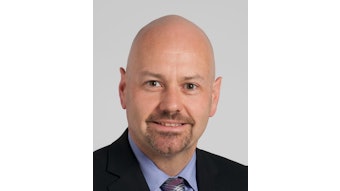So you think you know pneumonia?
Pneumonia may be considered a common illness, but there are developments in diagnosis and treatment happening every day.

With the focus on COVID-19 over the past two years, other extremely common respiratory illnesses like community-acquired pneumonia could get overlooked. But plenty has been happening in that field, including debates over the use of novel markers and therapeutics.
Josue Zapata, MD, associate professor of clinical medicine and associate chief of the Medical Service at the San Francisco VA Medical Center, said there has been a lot of debate in the last few years about the role of procalcitonin—a blood marker that correlates with bacterial infection—in the diagnosis and treatment of pneumonia.
“Hospitalists know about the harms of overtreatment and the need for judicious antibiotic use. The use of procalcitonin to curb excess antibiotic use seemed like a great step forward in balancing benefits and risks for one of the most common reasons for hospitalization and for antibiotic use in the U.S.,” Dr. Zapata said. “Just a few years ago, I had never heard of procalcitonin, then it seemed like suddenly it was all the rage. I was rapidly trying to figure out how to use it and adapt it into my practice to better care for patients.”
Dr. Zapata said his initial enthusiasm for procalcitonin was replaced by confusion and that complexity is something he plans to address in the session “Blue Jeans and Blue Lips: Updates in Pneumonia.”
“As more and more studies came out showing the benefits, challenges, and pitfalls of using procalcitonin, I found myself more and more puzzled about what I should be doing,” he said. “Through case examples, we hope to shed some light on why there has been so much debate and how hospitalists should view the use of procalcitonin in 2022.”
Dr. Zapata said another change in the treatment of pneumonia has been a gradual move to shorter and shorter antibiotic courses as the field of medicine has developed more appreciation for the harms associated with antibiotic overuse. Plus, more studies have emerged suggesting shorter courses are just as good as longer courses.
“We know from the data that many patients are being prescribed unnecessarily long antibiotic courses even by current standards. In addition to moving clinical practice closer to the guidelines, there is also a question about how short we can go,” he said. “Infectious Disease Society of America guidelines suggest at least five days, but some new evidence in the last year or so has really pushed the envelope beyond that. We’ll review why the current guidelines are the way that they are and how we are integrating this new data into our practice.”
Although pneumonia may be considered a common illness, Dr. Zapata said there is still a lot that even the most seasoned hospitalist may not know about the latest in its treatment.
“Our hope is that clinicians will get some new information that likely confirms what they are already doing in practice, but perhaps they never understood the exact evidence behind it,” he said. “There is a tremendous amount of nuance and art in using the evidence to provide optimal treatment for patients. I suspect that many hospitalists who thought that they knew a great deal about pneumonia will be surprised by some of the insights and discourse.”
Visit SHM Meeting News Central for more coverage.











